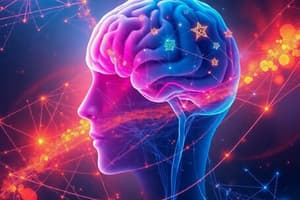Podcast
Questions and Answers
What does an intelligence quotient (IQ) represent?
What does an intelligence quotient (IQ) represent?
- An assessment of verbal comprehension
- The ratio of mental age to chronological age (correct)
- A measure of social intelligence
- The total intelligence a person has
Who was the first to introduce the concept of mental age?
Who was the first to introduce the concept of mental age?
- William Stern
- Louis L. Thurstone
- Howard Gardner
- Alfred Binet (correct)
Which of the following is NOT one of the seven primary mental abilities according to Louis L. Thurstone?
Which of the following is NOT one of the seven primary mental abilities according to Louis L. Thurstone?
- Verbal comprehension
- Emotional intelligence (correct)
- Numerical ability
- Word fluency
Which type of intelligence is defined as the ability to manage ideas and symbols?
Which type of intelligence is defined as the ability to manage ideas and symbols?
What did Howard Gardner propose with his theory of multiple intelligences?
What did Howard Gardner propose with his theory of multiple intelligences?
What does intelligence primarily encompass according to the discussed definitions?
What does intelligence primarily encompass according to the discussed definitions?
Who is credited with the title 'Father of psychological testing' for his contributions to measuring intelligence?
Who is credited with the title 'Father of psychological testing' for his contributions to measuring intelligence?
Why was Alfred Binet commissioned by the French government in the early twentieth century?
Why was Alfred Binet commissioned by the French government in the early twentieth century?
According to the content, how are individual differences defined?
According to the content, how are individual differences defined?
Which of the following is NOT considered an aspect of intelligence as per the definitions provided?
Which of the following is NOT considered an aspect of intelligence as per the definitions provided?
Study Notes
Individual Differences
- The more or less enduring psychological characteristics that differentiate one person from another, contributing to individual identity.
Intelligence
- Refers to intellectual potential, innate and measurable, difficult to change.
Historical Perspective on Individual Differences and Human Abilities
- Early studies of human abilities began in the late 19th century.
- Francis Galton, considered the father of psychological testing and individual differences, coined the term "mental test" and invented the first psychological test methods to measure intelligence and ability.
- Alfred Binet's early work on human abilities was similar to Galton's. Binet was commissioned by the French government to identify mentally deficient children in French schools.
What is Intelligence
- An abstract concept encompassing the ability to think, learn from experience, solve problems, and adapt to new situations.
- David Wechsler, in 1939, defined intelligence as the overall capacity of an individual to act purposefully, think rationally, and interact effectively with their environment.
- Intelligence encompasses:
- Understanding
- Learning
- Acting purposefully
- Thinking rationally/abstractly
- Adjusting
- Intelligence influences our perceptions and judgments of others, as well as our self-awareness.
IQ, or Intelligence Quotient
- The term "intelligence quotient" (IQ) was coined by William Stern in the early 20th century.
- Alfred Binet developed the first intelligence tests to help identify schoolchildren requiring extra academic assistance.
- Binet introduced the concept of mental age, representing the set of abilities children at a specific age possess.
Intelligence Quotient or IQ
- The IQ is the ratio between mental age and chronological age.
- Mental Age: The age level at which a child demonstrates capabilities, measured through intelligence tests.
- Chronological Age: The time elapsed since birth.
- IQ formula: IQ = MA / CA x 100
- Example: A 12-year-old child performing better than other children their age on an intelligence test would score higher and be considered a bright child.
Primary Mental Abilities
- Louis L. Thurstone focused on seven primary mental abilities rather than a single general intelligence.
- These abilities include:
- Associative memory: Remembering and recalling information.
- Numerical ability: Solving mathematical problems.
- Perceptual speed: Recognizing differences and similarities among objects.
- Reasoning: Finding rules or patterns.
- Spatial visualization: Visualizing relationships.
- Verbal comprehension: Defining and understanding words.
- Word fluency: Generating words rapidly.
Intelligence Types
- Thorndike categorized three types of intelligence:
- Social intelligence: Understanding and managing relationships with other people.
- Concrete intelligence: More commonly known as mechanical intelligence, relating to concrete materials.
- Abstract intelligence: Understanding and managing abstract concepts like ideas, symbols, and principles.
Gardner's Theory of Multiple Intelligences
- Proposed by Howard Gardner.
- Stresses that intelligence is not a single, general ability but rather a collection of different kinds of intelligence.
- Gardner identified seven intelligences initially, adding an eighth later.
Gardner's Eight Intelligences
- Linguistic: Ability to analyze information and create products involving oral and written language.
- Logical-Mathematical: Ability to develop equations, proofs, solve abstract problems, and make calculations.
- Spatial: Ability to recognize and manipulate large-scale and fine-grained spatial images.
- Musical: Ability to produce, remember, and derive meaning from diverse sound patterns.
- Naturalist: Ability to recognize and differentiate among various types of plants, animals, and weather formations.
- Bodily-Kinesthetic: Ability to use one's own body to create products or solve problems.
- Interpersonal: Ability to recognize and comprehend the moods, desires, motivations, and intentions of others.
- Intrapersonal: Ability to recognize and understand one's own moods, desires, motivations, and intentions.
Studying That Suits You
Use AI to generate personalized quizzes and flashcards to suit your learning preferences.
Related Documents
Description
Explore the key concepts of individual differences and intelligence in psychology. This quiz covers historical perspectives, influential figures like Francis Galton and Alfred Binet, and definitions of intelligence. Test your understanding of how psychological characteristics shape individual identity.




